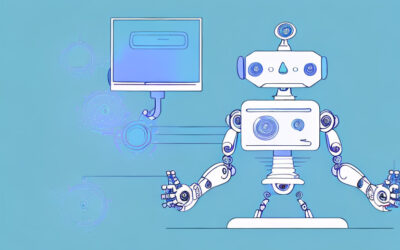Artificial Intelligence (AI) has become one of the most transformative technologies of the 21st century. From healthcare to finance and retail, AI has revolutionized various industries, offering unprecedented opportunities for businesses to streamline processes, improve customer experiences, and drive growth.
Understanding Artificial Intelligence
AI refers to the development of computer systems that can perform tasks that would typically require human intelligence. This includes problem-solving, natural language processing, machine learning, and more. By mimicking human cognition and decision-making processes, AI has the potential to revolutionize the way businesses operate.
Artificial Intelligence, or AI, is a fascinating field that involves the simulation of human intelligence into machines. It allows them to acquire and apply knowledge, reason, and learn from experience. AI can analyze vast amounts of data and make predictions or decisions based on patterns and algorithms.
What is AI?
At its core, AI involves the simulation of human intelligence into machines. This enables them to acquire and apply knowledge, reason, and learn from experience. AI can analyze vast amounts of data and make predictions or decisions based on patterns and algorithms.
Imagine a world where machines can understand and interpret human language, recognize images, and even drive cars autonomously. This is the power of AI. It has the potential to transform industries and revolutionize the way we live and work.
The Evolution of AI
The journey of AI began in the 1950s with the development of early computational models. Scientists and researchers were fascinated by the idea of creating machines that could think and learn like humans. However, progress was slow due to limited computing power and data availability.
Over the years, advancements in technology have accelerated the progress of AI. The exponential growth of computing power, coupled with the availability of large datasets, has allowed researchers to develop more sophisticated AI algorithms. Today, AI applications range from speech recognition systems to autonomous vehicles.
One of the major milestones in the evolution of AI was the development of machine learning algorithms. These algorithms enable machines to learn from data and improve their performance over time. Machine learning has opened up new possibilities for AI, allowing it to tackle complex problems and make accurate predictions.
Different Types of AI
AI can be categorized into three main types: narrow or weak AI, general AI, and superintelligent AI. Narrow AI is designed to perform specific tasks, such as voice-activated assistants or image recognition systems. These AI systems excel at their designated tasks but lack the ability to perform tasks outside their domain.
On the other hand, general AI possesses human-level intelligence and can perform any intellectual task that a human can do. This level of AI is still largely theoretical and has not been fully realized. However, researchers and scientists are continuously working towards developing AI systems that can exhibit general intelligence.
Superintelligent AI is the most advanced form of AI. It surpasses human intelligence in all aspects and has the ability to outperform humans in any intellectual task. Superintelligent AI is still a topic of debate and speculation, as its development raises ethical and existential concerns.
Understanding the different types of AI is crucial in order to grasp the potential and limitations of this technology. Each type of AI has its own strengths and weaknesses, and their applications vary depending on the specific task at hand.
The Impact of AI on Various Industries
AI has the potential to transform multiple industries, bringing operational efficiency and creative problem-solving capabilities.
Artificial Intelligence (AI) has emerged as a game-changer in various sectors, revolutionizing the way businesses operate and interact with customers. Its ability to process and analyze vast amounts of data with speed and accuracy has opened up new possibilities in industries such as healthcare, finance, and retail.
AI in Healthcare
In the healthcare industry, AI can improve diagnostic accuracy, identify treatment options, and even predict disease outbreaks. By leveraging machine learning algorithms, AI systems can analyze medical images, such as X-rays and MRIs, to assist doctors in detecting abnormalities that might be missed by the human eye. These AI-powered tools not only enhance the accuracy of diagnoses but also help healthcare professionals make informed decisions about treatment plans.
Furthermore, AI-powered chatbots can offer immediate medical advice to patients, triaging cases to reduce waiting times and healthcare costs. These virtual assistants can provide patients with basic medical information, answer frequently asked questions, and even schedule appointments. By automating these tasks, healthcare providers can focus more on delivering personalized care to patients, improving overall patient satisfaction.
AI in Finance
In finance, AI algorithms analyze vast amounts of financial data, identify patterns, and make predictions about market trends. This enables financial institutions to make data-driven decisions regarding investments, risk management, and portfolio optimization. By leveraging AI, banks and investment firms can automate processes such as loan approvals, fraud detection, and algorithmic trading.
Automated chatbots have also found their way into the finance industry, providing personalized financial advice to customers. These chatbots can assess a customer’s financial situation, goals, and risk tolerance to recommend suitable investment options. Moreover, AI-powered fraud detection systems can flag suspicious transactions swiftly, minimizing financial losses and protecting customers from fraudulent activities.
AI in Retail
In the retail industry, AI enables personalized shopping experiences, recommendation systems, and inventory management. By analyzing customer behavior and preferences, retailers can tailor their offerings and marketing strategies to drive customer satisfaction and loyalty. AI-powered recommendation engines use machine learning algorithms to suggest products to customers based on their browsing and purchase history, increasing the chances of making a sale.
Moreover, AI can optimize inventory management by predicting demand patterns and automating replenishment processes. By leveraging AI, retailers can ensure that they have the right products in stock at the right time, minimizing out-of-stock situations and reducing inventory holding costs.
Additionally, AI-powered virtual shopping assistants can provide personalized assistance to customers, helping them navigate through product catalogs, answer queries, and even provide style recommendations. This enhances the overall shopping experience, making it more convenient and enjoyable for customers.
Overall, AI has the potential to revolutionize various industries by enhancing operational efficiency, improving decision-making processes, and delivering personalized experiences to customers. As technology continues to advance, the impact of AI is only expected to grow, opening up new opportunities for businesses to thrive in the digital age.
How to Implement AI in Your Business
Artificial Intelligence (AI) has become a game-changer in the business world, revolutionizing various industries and providing companies with new opportunities for growth and efficiency. However, implementing AI in your business requires careful planning and execution to ensure successful integration and optimal results.
Identifying Opportunities for AI
The first step in implementing AI is to identify the areas in your business that can benefit most from this technology. Look for processes that are repetitive, data-heavy, and require decision-making. For example, customer service can greatly benefit from AI-powered chatbots that can handle customer inquiries and provide personalized assistance. Supply chain management can be optimized with AI algorithms that analyze data to predict demand and optimize inventory levels. Data analysis can be enhanced with AI tools that can process large volumes of data and extract valuable insights.
By identifying these opportunities, you can prioritize the implementation of AI in areas that will have the most significant impact on your business operations and outcomes.
Choosing the Right AI Tools
Once you have identified the opportunities for AI, the next step is to research and select the AI tools that best fit your business needs. Consider factors such as scalability, ease of integration, and the capabilities offered by different AI platforms. There is a wide range of AI tools available, each with its own strengths and limitations.
For example, if your business requires natural language processing capabilities, you might consider tools like Google Cloud Natural Language API or IBM Watson. If you need computer vision capabilities, tools like Microsoft Azure Computer Vision or Amazon Rekognition can be a good fit. It is essential to evaluate and compare the features and functionalities of different AI tools to ensure that they align with your business requirements and goals.
Training Your Team on AI
Implementing AI also requires upskilling your workforce to effectively leverage the technology. While AI can automate certain tasks, it is crucial to have employees who can work alongside AI systems and make the most of their capabilities.
Provide training programs and resources to help your employees understand AI and its applications. This can include workshops, online courses, or even hiring AI experts as consultants or trainers. By investing in your team’s AI education, you empower them to adapt to the changing technological landscape and contribute to the success of AI implementation in your business.
Moreover, fostering a culture of continuous learning and innovation can encourage employees to embrace AI as a tool that enhances their work rather than a threat to their job security. This mindset shift is crucial for the successful integration of AI into your business processes.
In conclusion, implementing AI in your business can bring numerous benefits, but it requires careful planning, identifying the right opportunities, selecting suitable AI tools, and training your team. By taking these steps, you can unlock the full potential of AI and gain a competitive edge in today’s rapidly evolving business landscape.
Maximizing the Benefits of AI
Implementing AI is just the beginning; maximizing its benefits is key to gaining a competitive edge.
Improving Efficiency with AI
AI can automate mundane tasks, allowing your employees to focus on higher-value work. By streamlining processes, AI improves efficiency and reduces operational costs. This enables your business to allocate resources strategically and achieve better outcomes.
Enhancing Customer Experience with AI
By leveraging AI, you can personalize customer experiences at scale. AI-powered chatbots and virtual assistants offer round-the-clock support, resolving queries and providing personalized recommendations. This boosts customer satisfaction and strengthens brand loyalty.
Leveraging AI for Data Analysis
AI-driven analytics tools enable businesses to process and analyze vast amounts of data quickly. By extracting actionable insights from complex datasets, AI empowers organizations to make data-driven decisions and identify new growth opportunities.
As AI continues to evolve, businesses across industries have the opportunity to leverage this technology for maximum benefit. By understanding the different types of AI, exploring its impact on various sectors, and implementing it strategically, businesses can unlock new levels of efficiency, customer satisfaction, and growth. Embrace the power of AI and propel your business into the future of innovation.



